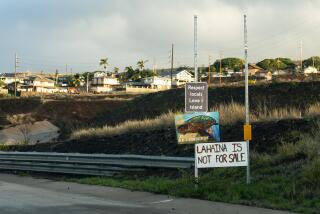South Africa’s Desmond Tutu to retire from public life
Sipping tea, and serving his beloved wife her first cup every morning in bed. Watching soccer. Spending more time with his family. Reading. Writing. Praying.
And just thinking
Retired Anglican Archbishop Desmond Tutu sketched out a quiet, blissful future Thursday at a news conference as he announced his decision to withdraw from public life.
All he wants in his old age, he said, is a peaceful family life in his hometown, Cape Town. No more interviews, no more speeches, no more plane-hopping.
The Nobel peace laureate, along with former President Nelson Mandela, one of South Africa’s most beloved figures, is regarded as the country’s voice of conscience. Although he retired as an Anglican archbishop in 1996, he has remained a prominent public figure.
But he said Thursday that he would retire from public life in October, when he turns 79.
From now on, he says, he’ll “shut up.” Mostly.
“Sometimes I might find I can’t resist,” he said mischievously.
“The time has now come to slow down, to sip rooibos tea with my beloved wife in the afternoons, to watch cricket and rugby and soccer and tennis, to travel to visit my children and grandchildren, rather than to conferences and conventions and university campuses,” he said. “I think I’ve done as much as I can, and really do need time for the other things that I have wanted to be doing.”
“I do want a little more quiet.”
Tutu was one of apartheid’s fiercest opponents. After the regime’s end, he chaired the Truth and Reconciliation Commission, under which many people guilty of crimes under apartheid confessed and repented in return for amnesty.
He is an ebullient figure with a raucous laugh and keen sense of humor. His impish delight, wrapped in South’s Africa’s soccer colors last month at the kickoff concert of the World Cup soccer tournament, thrilled many watching around the world.
“I’m dreaming, I’m dreaming. It’s so beautiful. Wake me up!” he said at the concert. “We want to say to the world: ‘Thank you for helping this ugly, ugly worm, or caterpillar which we were, to become a beautiful, beautiful butterfly!’
But in recent years, Tutu has spoken often of his disappointment in post-apartheid South Africa. He has angered the ruling African National Congress with his blunt criticism. He has attacked the enrichment of a tiny politically connected minority. And he has frequently expressed despair over South Africa’s high rates of violent crime.
After the announcement, opposition leader Helen Zille called Tutu the country’s “moral compass.”
“He has become an international icon of fearless integrity, who has taken a stand against power abuse throughout his long public life,” she said. “He has paid a high price for it at times, but always triumphed through his blend of faith and self-deprecating humor.”
Tutu will remain a member of a group of elder statesmen, including Mandela, former U.N. Secretary-General Kofi Annan, former President Jimmy Carter and others who campaign for international peace and human rights. He will continue to support the Desmond Tutu Center for Peace in Cape Town.
Asked whether he had any regrets, he said a tiny part of him wished he could have been a doctor.
“And maybe somebody might tell me what it is like to be tall.”
Tutu who was successfully treated for prostate cancer in 1997, said he was in good health.
The retired archbishop spelled out his hopes for South Africa.
“More than anything else I long so much that we will become the country that we have it in us to become … one where every single South African actually feels they matter. Even when they are poor they know they matter.
“And we do have the capacity. We’ve shown we have the capacity. We can ensure that we can build decent homes for everybody.
“But it is more than that. I will go to my grave happily when I see us become what we have it in us to become: caring, compassionate, gentle, sharing.”
More to Read
Start your day right
Sign up for Essential California for news, features and recommendations from the L.A. Times and beyond in your inbox six days a week.
You may occasionally receive promotional content from the Los Angeles Times.






